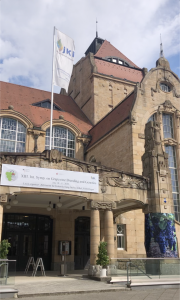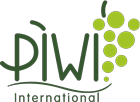This was the motto of the 13th International Symposium on Grapevine Breeding and Genetics, held from July 10-17 in the Art Nouveau Hall in Landau, Germany, where renowned breeding researchers and those involved in breeding and refining met.
The event was held under the patronage of the German Federal Ministry of Food and Agriculture (BMEL) and the International Organization of Vine and Wine, OIV for short. The dedicated team of the Julis Kühn Institute organized a varied and exciting program of lectures, discussions and excursions, which of course included the gala dinner on Thursday evening.
The high-ranking conference attracted participants from 22 countries and shed light on the scientific aspects of the topic in great depth and detail. By scheduling sufficient breaks for refreshment and strengthening of mind and soul,

opportunities were created for personal exchange. It was also enjoyable that tasting zones for PIWI wines were offered on various occasions.
The comprehensive conference program allowed stakeholders from all over the world to present the latest results and covered topics ranging from PIWIs, the treatment of genetic resources, the study of genetic principles to the potential of improving traditional grape varieties through new breeding techniques.
JKI President Frank Ordon speaks to the heart of us PIWI enthusiasts when he says: "If breeding research and vine breeding do not develop any solutions for the problems of winegrowers - especially in the form of disease-resistant and climate-adapted varieties - then it will become increasingly difficult to ensure economically viable viticulture with the required quality against the background of the Farm to Fork strategy of the EU . In the long term, this will also have an impact on the cultural landscape in the wine-growing regions.”
For all those who would like to delve a little deeper into the subject matter, we have linked summaries of the presentations here for our members to read.
https://www.openagrar.de/receive/openagrar_mods_00080039
Please respect the copyright and refer to it correctly when using it in your own publications.
One positive aspect was that all speakers always pointed out that they were representative of their entire team and that they could only achieve so much together. This is where we build the bridge to our PIWI network, because we also achieve more together by joining forces.
This open and collaborative approach is also followed by an initiative of the UC Davis & Cantu Lab with an open database for vine genomes, where all players can submit their own genomes.
We are already excited to see what rapid developments we can witness by the time of the next symposium in 2026.

